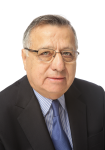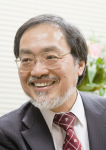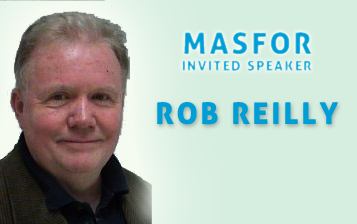 |
|
ALİ N. AKANSUNew Jersey Institute of Technology
BIO: Ali N. Akansu received the B.S. degree from the Technical University of Istanbul, Turkey, the
M.S. and Ph.D degrees from the Polytechnic University, Brooklyn, New York, all in Electrical
Engineering. Since 1987, he has been with the New Jersey Institute of Technology, where he is a
Professor of Electrical and Computer Engineering. He was a Founding Director of the New Jersey
Center for Multimedia Research (NJCMR), and NSF Industry-University Cooperative Research Center
(IUCRC) for Digital Video & New Media. Dr. Akansu has been an active member of the professional circles over the last two decades, and is a
Fellow of the IEEE. He has been a well-published author, gave numerous invited talks, guided theses
on the theory of signals & transforms, applications in Internet multimedia and information security,
digital communications, and computational finance.
TITLE: A Vision for Future of the Global Village: An Electrical Engineer’s Perspective
Abstract:
The ever evolving Internet and inter-connection for fast information flow is
considered by many as the highest impact development in human history. This
viral evolution and integration from macro to micro scales has been reshaping
the way humans live, interact and coexist in this world.
The genesis of human development has been the improvements and efficiency driven
by technological progress over several millennia. For the last century,
scientists and engineers have been frontiers of this process. This talk will
present a brief status on where we are today along with a few thought provoking
remarks on where the global village might be in the coming decades. Moreover, it
will highlight some of the opportunities and challenges this unprecedented
socio-economic transformation may bring to the engineering community at large.
|
|
 |
|
Mehmet ÇELEBİLERTurknet A.S.
Satko Technology
BIO: Mehmet Izzi Çelebiler has worked on solving problems in telecommunications, in the USA
and in various countries of Europe, and founded two companies in Turkey. For half a century he has
contributed to the development of telecommunication networks and services by taking part in the
development of digital communications, and in the liberalization of the telecommunication sector.
He holds the Ph.D. degree from the University of Pennsylvania, the MSc. degree from the Technical
University of Istanbul and the highschool diploma from Galatasaray Lisesi.
TITLE: Curiosity: The Insatiable Thirst for Information
Abstract: 
Curiosity is what fuels innovation, commitment is what makes it happen. Everybody talks about
innovation, everybody claims to support it, everybody wants it to happen. So conferences are
arranged, universities open courses, governments allocate funds for innovation to occur somehow,
somewhere. The institutions actively promoting innovation however, do not appear to have the
curiosity to investigate what is happening around themselves nor are they willing to spend their
money to buy ideas, advice, equipment just to find out what is going on.
Innovation can occur in an environment of curious people. People who are curious, enough to pay to
find out how and why certain things happen, are necessary for supporting those who innovate.
I will talk about curiosity and its contribution to the development of technology. I will also talk about
failed attempts to create and develop technology without creating and sustaining curiosity.
|
|
|
 |
|
Ethem Eldem Turkcell İletişim Hizmetleri A.Ş.
BIO: Ethem Eldem has started his career in local counseling firms in 1993. Later, he worked with
more than a hundred of firms in organizational planning and change management issues at the
Human Resources Counseling Department of Profil International and Pricewaterhouse Coopes. At the
end of 2003, he started working with Turkcell İletişim Hizmetleri A.Ş. as Organizational Development
Department Head, and currently he is working as a department head responsible of Product
Marketing and Partnership Management.
TITLE: Mega trends towards 2020 and their effects on our business
Abstract:
In the next decade, very critical changes are expected globally. In addition to, taking their
consequences in different times and dimensions, another important effect of these changes that will
affect our lives is creating nested professions. In this aspect, not our education but the discipline to
work together will gain importance. In this presentation, we will share these trends and examples of
this serious change. |
|
 |
|
Daniel FOTYGilgamesh Associates LLC
Sarissa Radio, Inc.
BIO: Daniel Foty has some two decades of engineering and management experience
in the mainstream of the technology industry
specifically in integrated circuits
and wireless communications. He is the President
his own consulting and research firm, Gilgamesh
Associates, LLC, which works in very demanding areas of design and
development such as signal processing, wired/wireless communications, and
ultra-low-power design. A serial entrepreneur, he is currently beginning to
co-organize a new start-up company (Sarissa
Radio, Inc., where he presently serves
as Chief Technical Officer (CTO)) for the development of new technologies for
ubiquitous ultra-high-speed, low-power, low-cost wireless interconnectivity.
Dr. Foty is also an Adjunct Professor of Electrical Engineering at the Georgia
Institute of Technology (“Georgia Tech”), and has
served as an external graduate thesis
examiner/advisor with the Tallinn University of
Technology (Estonia), the University of
Pretoria (South Africa), and the Tshwane
University of Technology (South Africa). He is
the author of the best selling book, MOSFET
Modeling with SPICE: Principles and Practice,
which was published in 1997 by Prentice-Hall and
is now in its third printing; a
Vietnamese language edition was published in early 2006. In addition, he has
authored or co-authored some 100 journal articles and conference presentations,
and is a frequent plenary/keynote speaker at major international conferences
throughout the world.
Dr. Foty holds the B.S. degrees in Physics and Chemistry from Bates College,
the M.S. degree in Electrical Engineering from
the University of Illinois, and the
Ph.D. degree in Materials Science from the University of Vermont.
TITLE: Addressing the Emerging Wireless Bandwidth Crisis and the Need for Power- Efficient
Bandwidth: Prospects for mm-Wave Radio Technology
Abstract: 
In recent years, demand for wireless bandwidth has been growing rapidly. In fact, a recent study has
predicted that by 2015, the demand for wireless bandwidth will increase to twenty-six times that of
today. However, the ability of wireless networks to handle even contemporary traffic is becoming
problematic, with network overloading becoming a growing and widening problem; if data traffic
increases by even a fraction of projections, wireless networks (as presently constructed) will be
completely unable to cope with demand. In addition, according to Shannon Information Theory,
there is no limit to the ability to increase wireless bandwidth; however, this is only possible via a
corresponding increase in the power consumption - something that is unacceptable in mobile
electronic devices.
This presentation will review the current state of mm-wave radio technology as a vehicle for
addressing this incipient bandwidth crisis. The main promise of mm-wave radio is that it offers a
route to power-efficient bandwidth - that is, the ability to greatly increase the available data rates
without increasing the power consumption. To deliver successful mm-wave radio technology for
general use, a number of multifaceted challenges will need to be overcome; these range all the way
from basic integrated circuit design up to network design and network management. A complete
effort on all of these challenges is necessary for successful commercial deployment of high-
bandwidth, low power mm-wave networks. |
|
 |
|
Toshio FUKUDANagoya University
BIO: Toshio Fukuda graduated from Waseda University, Tokyo, Japan in 1971 and received the
Master of Engineering degree and the Doctor of Engineering degree both from the University of
Tokyo, in 1973 and 1977, respectively. He joined the National Mechanical Engineering Laboratory in
Japan in 1977, the Science University of Tokyo in 1981, and then joined Department of Mechanical
Engineering, Nagoya University, Japan in 1989.
At present, he is Professor of Dept. of Micro and Nano System Engineering and Dept. of Mechano-Informatics and Systems, Nagoya University, Japan. He is director of Center for Micro and Nano
Mechatronics. He is mainly engaging in the research fields of intelligent robotic system, micro and
nano robotics, bio-robotic system, and technical diagnosis and error recovery system.
TITLE: Advanced service robotics and automation
Abstract: 
There are growing demands on robotics and automation in the service sector for many years due to
the age quake, silver society and man power shortage. Some need more cost effective systems, while
others do more human friendly communication and interactive interface. Now that robotics is so
advanced with sensor, actuator and computational intelligence along with the CPU development, it is
expected to make much wider applications to service sector than to the manufacturing sector.
In this presentation, the robotics and automation is briefly overviewed for the sake of human
assistance and supports. Then there have been so many attempts to make robots more friendly and
usable to human and some showed very successful results in bio-medicine field, material flow and
daily life. From these applications, it turned out to be much more important for human service sector
such that advanced robotics and automation system in this domain should have more cognitive
functions as human intention estimation explicitly.
In the robotics, “intelligent cane system” is shown as one of the examples of robotics systems.
Human can employ this robot as a partner robot in the daily life, since the robot can help the human
to navigate and guide to the goal by estimating human intention. In the manufacturing automation,
human coworker and robot coworker can work together at the same working location called
“Intelligent Hybrid Cell” by cooperation and collaboration using the human intention estimation.
Thus small products systems are expected to work better by trading off the cost of the robot
software and human cost, by taking care of the safety issue between human and robots interaction
in the automation system |
|
 |
|
Oussama KhatibStanford University
BIO: Oussama Khatib received his Doctorate degree in Electrical Engineering from Sup’Aero, Toulouse, France, in 1980. He is Professor of Computer Science at Stanford University. His current research, which focuses on human-centered robotics, is concerned with human motion synthesis, humanoid robotics, haptic teleoperation, medical robotics, and human-friendly robot design. He served as the Director of the Stanford Computer Forum, a corporate affiliate program. He is Co-Editor of the STAR series, the Springer Handbook of Robotics, and has served on the Advisory and Editorial Boards of several journals, as well as Chair or Co-Chair for numerous international conferences. He is a Fellow of IEEE and has served RAS as a Distinguished Lecturer and as a member of the Administrative Committee. Professor Khatib is the President of the International Foundation of Robotics Research (IFRR) and a recipient of the Japan Robot Association (JARA) Award in Research and Development and the IEEE Robotics and Automation Society Pioneer Award.
TITLE: An Open Source Extensible Software Package to Create Whole-Body Compliant Skills in Personal Mobile Manipulators
Abstract: 
Whole-body operational space control is a powerful compliant control approach for robots that physically interact with their environment. The underlying mathematical and algorithmic principles have been laid in a large body of published work, and novel research keeps advancing its formulation and variations. However the lack of a reusable and robust shared implementation has hindered its widespread adoption.
To fill this gap, we present an open-source implementation of whole-body operational space control that provides runtime configurability, ease of reuse and extension, and independence from specific middlewares or operating systems. Our libraries are highly portable, and the application code contains a thin adaptation layer for specific development and runtime environments such as ROS.
In this paper, we briefly survey the foundations of whole-body control for mobile manipulation and describe the structure of our software. We performed experiments on two quite different robots to demonstrate that the software is mature enough for building a community of users and developers who can work on extensions and applications. |
|
 |
|
José del R. Millán EPFL
BIO: José del R. Millán is the Defitech Professor at Center for Neuroprosthetics of the Swiss Federal
Institute of Technology in Lausanne (EPFL) where he explores the use of brain signals for
multimodal interaction and, in particular, the development of non-invasive brain-controlled robots
and neuroprostheses. In this multidisciplinary research effort, Dr. Millán is bringing together his
pioneering work on the two fields of brain-machine interfaces and adaptive intelligent robotics.
He received his Ph.D. in computer science from the Univ. Politècnica de Catalunya (Barcelona,
Spain) in 1992, where he was an assistant professor for three years. He was also a research
scientist at the Joint Research Centre of the European Commission in Ispra (Italy), a senior
researcher at the Idiap Research Institute in Martigny (Switzerland), and a visiting scholar at the
Universities of Stanford and Berkeley as well as at the International Computer Science Institute in
Berkeley.
His research on brain-machine interfaces (BMI) was nominated finalist of the European
Descartes Prize 2001 and he has been named Research Leader 2004 by the journal Scientific
American for his work on brain-controlled robots. The journal Science has reviewed his work as
one of the world’s key researchers in the field of BMI. Dr. Millán is the coordinator of a number of
European projects on BMI and also is a frequent keynote speaker at international events. His
work on BMI has received wide media coverage around the world.
TITLE: Non-Invasive Brain-Machine Interaction
Abstract:
The promise of Brain-Machine Interfaces (BMI) technology is to augment human capabilities
by enabling people to interact with a computer through a conscious and spontaneous
modulation of their brainwaves after a short training period. Indeed, by analyzing brain
electrical activity online, several groups have designed brain-actuated systems that provide
alternative channels for communication, entertainment and control. Thus, a person can
write messages using a virtual keyboard on a computer screen and also browse the internet.
Alternatively, subjects can operate simple computer games, or brain games, and interact with
educational software. Researchers have also been able to train monkeys to move a computer
cursor to desired targets and also to control a robot arm. Work with humans has shown that it
is possible for them to move a cursor and even to drive a wheelchair. In this talk I will review
the field of BMI, with a focus on non-invasive systems based on electroencephalogram (EEG)
signals. Key elements for a successful BMI are real-time feedback and training, of both the
subject and the classifier embedded into the BMI. I will also describe three brain-actuated
applications we have developed: a virtual keyboard, a brain game, and a wheelchair. Finally,
we discuss current research directions being pursued in order to improve the performance and
robustness of BMI systems, especially for real-time control of brain-actuated robots. In
particular, I'll mention work on recognizing cognitive states that are crucial for interaction.
|
|
 |
|
ROB REILLYIEEE Education Society
BIO: Rob Reilly received his B. S. degree from the University of Massachusetts, Amherts; Masters of Education degree from Springfield College, Springfield and Doctor of Education Degree from University of Massachusetts, Amherts. Currently he is the president of the IEEE Education society, Vice Chair, Member and in the Geographic Activity Board of the IEEE Computer Society, as well as other various award committees within. Dr. Reilly has been granted with many awards including IEEE William E. Sayle II Award for Achievement in Education (given by the IEEE Education Society in 2010) and IEEE Leadership Award (by the IEEE Member and Geographic Activity Board in 2009). His recent keynote/invited presentations focus on titles such as “Leadership and Educators” (Thailand, 2012), “Engineering and Emerging Technologies” (Saudi Arabia, 2011) and “Educational Pedagogy and Engineering” (Egypt, 2011).
TITLE: Becoming an Engineering Education Leader
Abstract:
One needs to grasp the emerging learning technologies and practices, and use them effectively and efficiently in order to deliver knowledge. There are six primary emerging technologies in education, which can be titled and categorized as cloud computing, mobile technology, gaming, open content, personal learning environments and learning analytics.
The delivery of knowledge mainly requires a solid vision of pedagogy, and leadership as a personal characteristic. The relationship between learning analytics and pedagogy proves that technologies integrated with pedagogically sound practices result in significant learning gains. The impact of technology, which is ultimately about education, must be driven by how people process information, which involves understanding the underlying process, which is how we deliver knowledge. In becoming an engineering education leader, one needs both management skills and leadership characteristics, as well as drive and charisma. One significant point to be highlighted is that leadership involves getting things started and facilitating change, whereas management keeps an organization running.
The integration of the right method for the delivery of knowledge and the required personal characteristics are keys to shaping the educational structure and curriculum. |
|
 |
|
Başar Yücel
BIO: Başar Yücel has a BSc Honours in EE (UK) and an MBA (Turkey), and has 27
years of professional experience - 5 years as SEVP in Banking, 6 years as
Partner in Management Consulting and 12 years as Group CEO for major
industrial conglomerates. Since 1989 he has been managing multi billion USD
turnover and 1,000+ workforce.He has significant performance in industry,
recognised for his high profile turnaround achievements in complicated
environments.
As a leader/CEO he has always focused in the use of latest technology/I.T.
to improve productivity and overall efficiency. To name a few:
Ekinciler Group: Promoted Environmental Management Systems, applied
just-in-time technology, focused in process control to increase productivity
(Iron and Steel Production); Applied GPS technology for fleet tracking of
the logistics company vehicles; Introduced supply chain management in
construction company to minimize losses; Implemented Total Quality
Management in all the Group Companies.
TITLE: Neye Niyet Neye Kısmet (This talk will be delivered in Turkish.)
Abstract:
Bir gencin eğitim hayatının sonuna kadar olan dönem ailenin imkanları, entellektüel altyapısı,
vizyonu ve daha sonra gencin de katkı ve çabalarıyla nisbeten daha planlanabilir, ancak eğitim sonrası dönemin planlanması çok daha çetrefillidir.
Bu konuşmada, konuşmacı, kişisel kariyer deneyimlerinden, tercihlerinden ve nedenlerinden, öğrencilerin hayatlarında
yeni bir döneme başlarken önlerindeki olası opsiyonlardan ve karar verirken dikkat etmeleri gereken konulardan bahsedecektir.
|


























